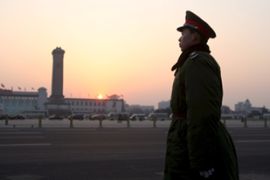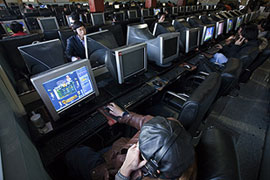China backlash at US rights report
China accuses US of using human rights as a political tool to attack other countries.

The report said that while accusing other nations of suppressing freedom of speech and communication, the US has itself stepped up eavesdropping and wiretapping of its own citizens.
It added that US citizens were threatened by “widespread violent crimes”, while abuses of power were common among US law enforcement officials.
|
“The United States not only has a terrible domestic human rights record, it is also the main source of many human rights disasters worldwide” Chinese report on Human Rights Record of the United States in 2009 |
“The United States not only has a terrible domestic human rights record, it is also the main source of many human rights disasters worldwide,” the Chinese report said, according to the official Xinhua news agency.
For the past 11 years China has made a point of releasing its own report on US human rights in response to the State Department’s annual global assessment.
This year’s exchange however comes amid a particularly tense period in relations between the two countries, following rows over US arms sales to Taiwan, a US visit by the Dalai Lama, and a raft of trade disputes.
In its report on Thursday, the US State Department singled out China alongside Iran, Cuba, North Korea and Myanmar as among the worst rights abusers in 2009.
It said China’s human rights record had worsened in some areas last year, with increased harassment of lawyers and activists, repression of Tibetan and Uighur minorities, and a tightening of already strict controls on the internet.
Net censorship
The US report placed particular attention on the suppression of online dissent with China among what it said were the worst offenders tightening censorship and other controls on the internet.
 |
| The US report placed particular attention on the suppression of online dissent in China [EPA] |
“China increased its efforts to monitor internet use, control content, restrict information, block access to foreign and domestic web sites, encourage self-censorship, and punish those who violated regulations,” it said.
The report added that the Chinese security services employed thousands of officials specifically to monitor and censor electronic communications.
Elsewhere it said China continued the repression of ethnic minorities in Xinjiang, the far western region which last year witnesses deadly rioting between indigenous ethnic Uighurs and Han Chinese.
In Tibet meanwhile it said China continued to impose “tight government controls” with Tibetans facing restrictions on practicing their religion and severe repercussions if they tried to escape to Nepal.
The report also increased incidents of “detention and harassment of human rights activists” while lawyers and legal firms that took on cases deemed sensitive by the government faced “harassment, disbarment and closure”.
Strained ties
In a further stab at China on Thursday, Barack Obama, the US president, called on Beijing to rebalance the global economy by moving to “a more market-oriented exchange rate”.
The Obama administration has been urging China to allow its currency, the yuan, to rise in value against the dollar with US manufacturers accusing Beijing of unfairly manipulating exchange rates to gain trade advantages over the United States.
His comments, coinciding with the publication of the State Department’s human rights report, are unlikely to go down well in Beijing.
The speech also comes amid mounting speculation that the US Treasury will soon formally label China a currency “manipulator” – a measure that would mandate punitive measures against China.
Beijing has held the value of the yuan steady against the dollar for 18 months to help Chinese exporters overcome the global downturn.
But it under intense pressure from Washington and other trading partners such as the European Union who say the policy is swelling China’s trade surplus.
Responding to Obama’s comments Wang Baodong, spokesman for the Chinese embassy in Washington, defended China’s stand.
Beijing’s economic and currency policies, he said, were “responsible and beneficial to the common interests of our two countries, particularly against the background of jointly facing up to the financial crisis.”